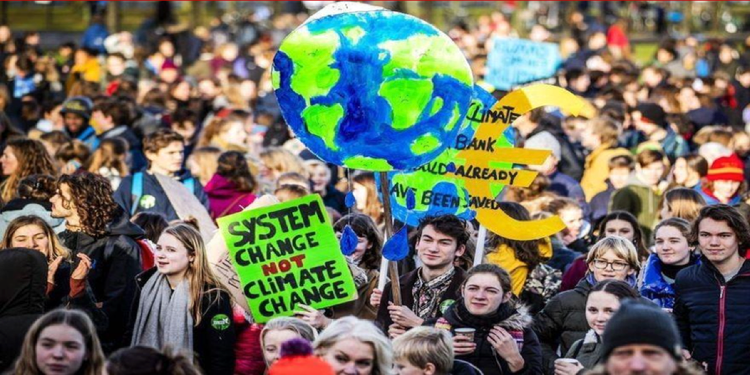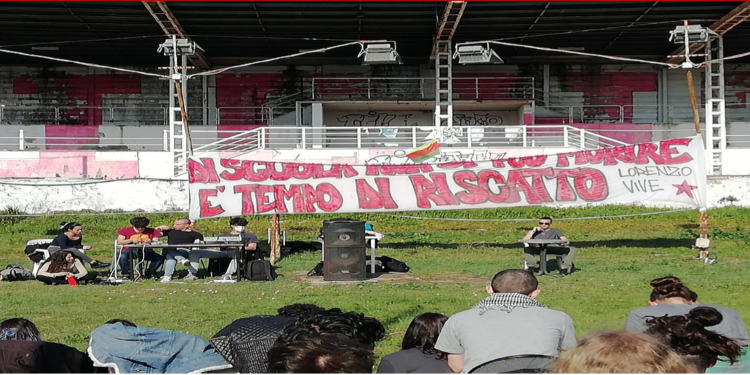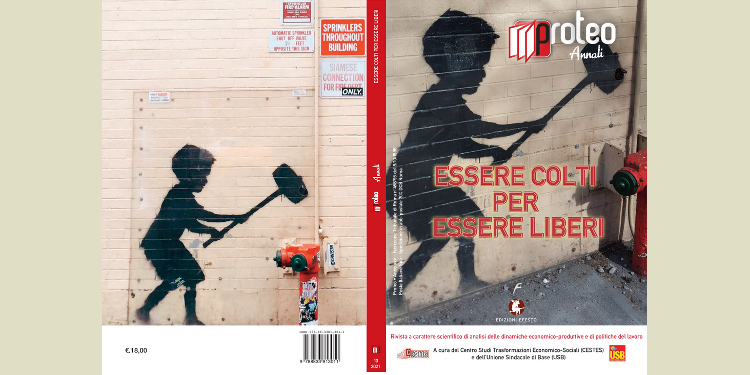| english | español | français | italiano |
Cambiare Rotta
Capitalist environmentalism is a perfect example of the use of this metaphor precisely because it is a model of production that in no way addresses the issue of reproduction/safeguarding nature and its resources.
The fact that it is an oxymoron can be understood philosophically from the fact that the infinite growth to which the capitalist production model structurally tends inevitably clashes with the physically finite system of our world.
From an economic point of view, the oxymoron can be explained because the relationship between capital and nature is an exploitative one in which the environment is considered a commodity from which to extract value and in which the capitalist has no other interest than the accumulation of profit.
Therefore, saving capitalism and saving the planet and humanity, as part of Nature, are two mutually exclusive tasks
The ecological crisis we are experiencing is concrete proof of the capital/nature oxymoron, a relationship that has reached its limits.
Enormous environmental disasters caused by climate change are tearing our planet apart: the great fires are no longer confined to countries far from Europe, such as the Amazon and Australia. This summer we have also seen fires in southern Italy, Spain and Greece, not to mention the copious floods from Catania to Naples in recent autumn months.
According to the IPCC’s Sixth Climate Change Report released in 2021, if the earth’s temperature rises at the rate of the last 50 years, environmental disasters like these will become the rule before the middle of our century, and the living conditions of younger generations will be seven times worse than those of the previous generation.
The increase in global temperature due to CO2 emissions from the use of fossil fuels and, evidently, from an incorrect and insufficient use of clean energy sources, poses the energy problem as the fundamental issue of the coming years in order to tackle the ecological crisis through a serious scientific analysis to be translated into an effective political battle.
Faced with this dystopian scenario, conferences and meetings on climate change have produced international agreements that have either fallen on deaf ears or have ended in nothing: most recently the Glasgow Cop26, whose final report is full of rhetoric, propaganda and “blah blah blah” on the commitment to keep the earth’s temperature rise below 1.5 degrees.
In short, the appeals to ‘world leaders’ to change things, to tackle the climate crisis and to meet those minimal (and insufficient) targets have once again demonstrated their inconsistency.
However, one real and novel element emerged from cop26: the renewed impetus on nuclear fission energy
Faced with an ecological heart attack and the urgent need for a radical change of course, what our ruling classes are banking on is an energy technology that is highly impactful in terms of fuel extraction, construction, costs, and waste treatment and storage.
The statements on nuclear power concern us closely, as they were made by both Ursula von der Leyen, President of the European Commission, and Timmermans, head of the European Green Deal: both consider it a key energy for the green transition.
In fact, in the last weeks of 2021 the European Commission produced the draft of the green taxonomy, i.e. the energy sources considered sustainable and essential for the ecological transition, in which natural gas and nuclear power have been included, which will soon be voted on by the European Parliament.
Thus, the words of the Italian Minister for Ecological Transition, Roberto Cingolani, when in October he advocated nuclear fission as a way out of the climate crisis, were not spoken in vain, but show a clear strategy that is not only local, but also European.
This makes manifest how much their ‘ecological transition’ is a real ecological scam.
Thus, the two oxymoronic figures take shape and it becomes clear how incompatible the EU’s economic structure and environmental sustainability are, and how the green economy is a strategy to continue to make profits and attempt to revive capitalist accumulation after a period of severe economic crisis due to the pandemic.
With the opening up to nuclear power, the green mask with which European capital is trying to repaint itself falls. In a general context of energy crisis, accelerated by the ongoing pandemic crisis, the choices on nuclear power are not merely technical and budgetary decisions on costs, but concern the strategic competitive role of the European pole, in which its energy independence and resilience are at stake, as well as the balances that the EU must maintain internally and externally.
An eventual confirmation and affirmation of nuclear power would therefore be a strategic choice by the EU in order not to fall behind in the multipolar competition. The closure by the German government of three of the last six nuclear power plants operating in Germany is not something that should make us think that nuclear power is not strategic for the EU as a whole, or that it is a trivial clash between parties and factions.
The trend towards the implementation of nuclear energy should be seen in a general and not just a specific way, it should be analysed from a strategic and not just a short-term point of view
Moreover, if nuclear power is really included in the green taxonomy, funding will be provided and it is likely that other member states will also aim for it.
As for Italy, by opening up to this technology, it is attempting to become energy self-sufficient and thus secure its place among the strong capitalist countries of the European Union.
Despite the rumours in recent days about the possible resignation of Minister Cingolani, what counts is the trend that the Draghi government is aiming for, not the individual executor. Confindustria’s approval of the possible construction of nuclear power plants in Italy was confirmed a few days ago through Bonomi’s words.
It has been demonstrated many times (first and foremost in the two referendums against nuclear power held in Italy in 1987 and 2011) that nuclear power is unsustainable because of its impact on the environment upstream and downstream of energy production – in terms of the effects on health during extraction, land consumption for the construction of power stations, water consumption for the huge cooling plants, and the production of nuclear waste that cannot be disposed of – and on society as a whole, in terms of costs.
The ‘fourth-generation nuclear power’ proposed by Cingolani and the big industry and energy apparatus has not so far yielded encouraging experimental results, and will not be able to reach a level of development such that it can be applied on a large scale for twenty years.
Based on this reflection, we want to promote a moment of confrontation with all those intellectuals, social, political and civil organisations that oppose the ecocidal drift that capitalism is producing.
Reality imposes a challenge on us: that of building an opposition capable of radically changing this production model, because this is the only way to save the planet and, therefore, the future of us young generations and future ones.
The narrative with which we have grown up has portrayed this society as “the best of all possible worlds”, to which there could be no alternative and which would be able to recover in the face of every crisis.
We grew up with a mindset of unbridled individualism, competition and exploitation.
However, the reality is quite different: in the face of the ecological infarction we are facing, there is no turning back, the green veil is being torn every day, showing the worst of all possible worlds in which there is no room for the marvellous progressive fortunes of our generation, against which reformist and individualist environmentalism is ineffective.
This latest decision in favour of nuclear fission brings us back down to earth: the interests of our generation are diametrically opposed to those of those who govern us. The only thing left to do is to prepare ourselves with solid scientific analyses, free from mystifying ‘green’ ideologies, and to build concrete campaigns.






